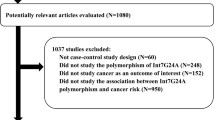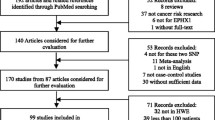Abstract
Previous studies on the associations of the NFKB1 -94 insertion/deletion polymorphism with cancer risk have produced conflicting results. The purpose of this meta-analysis is to define the effect of the NFKB1 -94 insertion/deletion polymorphism on cancer risk. A search of the literature by PubMed was performed to identify studies based on the predetermined inclusion criteria. Twenty-three studies consisting of 6,494 cases and 9,884 controls were identified and analyzed. Overall, significant association was observed between the polymorphism and cancer risk under all genetic models. Subgroup analysis according to ethnicity and cancer type also detected significant association. The NFKB1 -94 insertion/deletion polymorphism was associated with cancer risk in Asian population (dominant model: OR = 1.52, 95 % CI = 1.17–1.98; recessive model: OR = 1.50, 95 % CI = 1.26–1.79; II vs. DD: OR = 1.90, 95 % CI = 1.37–2.65; ID vs. DD: OR = 1.32, 95 % CI = 1.05–1.66; I vs. D: OR = 1.37, 95 % CI = 1.17–1.60), but not in Caucasian population. In addition, significant associations in OC, HCC, and OSCC were observed, but significant associations were not found in BC and LC. The current meta-analysis suggested that NFKB1 -94 insertion/deletion polymorphism may influence cancer risk in Asian population.



Similar content being viewed by others
References
Yaghoobi M, Rakhshani N, Sadr F, Bijarchi R, Joshaghani Y, et al. Hereditary risk factors for the development of gastric cancer in younger patients. BMC Gastroenterol. 2004;4:28.
Berlau J, Glei M, Pool-Zobel BL. Colon cancer risk factors from nutrition. Anal Bioanal Chem. 2004;378:737–43.
Sethi G, Shanmugam MK, Ramachandran L, Kumar AP, Tergaonkar V. Multifaceted link between cancer and inflammation. Biosci Rep. 2012;32:1–15.
Song L, Li J, Zhang D, Liu ZG, Ye J, Zhan Q, et al. IKKβ programs to turn on the GADD45α-MKK4-JNK apoptotic cascade specifically via p50 NFkB1 in arsenite response. J Cell Biol. 2006;175:607–17.
Ghosh S, Karin M. Missing pieces in the NF-kappaB puzzle. Cell. 2002;109:81–96.
Solan NJ, Miyoshi H, Carmona EM, Bren GD, Paya CV. RelB cellular regulation and transcriptional activity are regulated by p100. J Biol Chem. 2002;277:1405–18.
Giefing M, Wierzbicka M, Rydzanicz M, Cegla R, Kujawski M, et al. Chromosomal gains and losses indicate oncogene and tumor suppressor gene candidates in salivary gland tumors. Neoplasma. 2008;55:55–60.
Karban AS, Okazaki T, Panhuysen CI, Gallegos T, Potter JJ, et al. Functional annotation of a novel NFKB1 promoter polymorphism that increases risk for ulcerative colitis. Hum Mol Genet. 2004;13:35–45.
Zhang P, Wei Q, Li X, Wang K, Zeng H, Bu H, et al. A functional insertion/deletion polymorphism in the promoter region of the NFKB1 gene increases susceptibility for prostate cancer. Cancer Genet Cytogenet. 2009;191:73–7.
Cheng CW, Su JL, Lin CW, Su CW, Shih CH, Yang SF, et al. Effects of NFKB1 and NFKBIA gene polymorphisms on hepatocellular carcinoma susceptibility and clinicopathological features. PLoS One. 2013;8:e56130.
Mohd Suzairi MS, Tan SC, Ahmad Aizat AA, Mohd Aminudin M, Siti Nurfatimah MS, Andee ZD, et al. The functional −94 insertion/deletion ATTG polymorphism in the promoter region of NFKB1 gene increases the risk of sporadic colorectal cancer. Cancer Epidemiol. 2013;37:634–8.
Lo SS, Chen JH, Wu CW, Lui WY. Functional polymorphism of NFKB1 promoter may correlate to the susceptibility of gastric cancer in aged patients. Surgery. 2009;145:280–5.
Lin SC, Liu CJ, Yeh WI, Lui MT, Chang KW, Chang CS. Functional polymorphism in NFKB1 promoter is related to the risks of oral squamous cell carcinoma occurring on older male areca (betel) chewers. Cancer Lett. 2006;243:47–54.
Riemann K, Becker L, Struwe H, Nückel H, Dührsen U, Alakus H, et al. No association of the NFKB1 insertion/deletion promoter polymorphism with survival in colorectal and renal cell carcinoma as well as disease progression in B cell chronic lymphocytic leukemia. Pharmacogenet Genomics. 2006;16:783–8.
Lehnerdt GF, Bankfalvi A, Grehl S, Adamzik M, Lang S, Schmid KW, et al. No association of the NF-kappaB1 -94ins/delATTG promoter polymorphism with relapse-free and overall survival in patients with squamous cell carcinomas of the head and neck region. Int J Immunopathol Pharmacol. 2008;21:827–32.
Li P, Gu J, Yang X, Cai H, Tao J, Yang X, et al. Functional promoter −94 ins/del ATTG polymorphism in NFKB1 gene is associated with bladder cancer risk in a Chinese population. PLoS One. 2013;8:e71604.
Kopp TI, Friis S, Christensen J, Tjønneland A, Vogel U. Polymorphisms in genes related to inflammation, NSAID use, and the risk of prostate cancer among Danish men. Cancer Genet. 2013.pii: S2210-7762(13)00084-7
Huo ZH, Zhong HJ, Zhu YS, Xing B, Tang H. Roles of functional NFKB1 and β-TrCP insertion/deletion polymorphisms in mRNA expression and epithelial ovarian cancer susceptibility. Genet Mol Res. 2013;12:3435–43.
Huang D, Yang L, Liu Y, Zhou Y, Guo Y, Pan M, et al. Functional polymorphisms in NFκB1/IκBα predict risks of chronic obstructive pulmonary disease and lung cancer in Chinese. Hum Genet. 2013;132:451–60.
Vangsted AJ, Nielsen KR, Klausen TW, Haukaas E, Tjønneland A, Vogel U. A functional polymorphism in the promoter region of the IL1B gene is associated with risk of multiple myeloma. Br J Haematol. 2012;158:515–8.
Lin CW, Hsieh YS, Hsin CH, Su CW, Lin CH, Wei LH, et al. Effects of NFKB1 and NFKBIA gene polymorphisms on susceptibility to environmental factors and the clinicopathologic development of oral cancer. PLoS One. 2012;7:e35078.
Fan Y, Yu W, Ye P, Wang H, Wang Z, Meng Q, et al. NFKB1 insertion/deletion promoter polymorphism increases the risk of advanced ovarian cancer in a Chinese population. DNA Cell Biol. 2011;30:241–5.
Zhou B, Qie M, Wang Y, Yan L, Zhang Z, Liang A, et al. Relationship between NFKB1–94 insertion/deletion ATTG polymorphism and susceptibility of cervical squamous cell carcinoma risk. Ann Oncol. 2010;21:506–11.
Tang T, Cui S, Deng X, Gong Z, Jiang G, Wang P, et al. Insertion/deletion polymorphism in the promoter region of NFKB1 gene increases susceptibility for superficial bladder cancer in Chinese. DNA Cell Biol. 2010;29:9–12.
Andersen V, Christensen J, Overvad K, Tjønneland A, Vogel U. Polymorphisms in NFkB, PXR. LXR and risk of colorectal cancer in a prospective study of Danes. BMC Cancer. 2010;10:484.
Zhou B, Rao L, Li Y, Gao L, Wang Y, Chen Y, et al. A functional insertion/deletion polymorphism in the promoter region of NFKB1 gene increases susceptibility for nasopharyngeal carcinoma. Cancer Lett. 2009;275:72–6.
He Y, Zhang H, Yin J, Xie J, Tan X, Liu S, et al. IkappaBalpha gene promoter polymorphisms are associated with hepatocarcinogenesis in patients infected with hepatitis B virus genotype C. Carcinogenesis. 2009;30:1916–22.
Burnik FS, Yalçin S. NFKB1–94 insertion/deletion ATTG polymorphism in gastroenteropancreatic neuroendocrine tumors. Chemotherapy. 2009;55:381–5.
Riemann K, Becker L, Struwe H, Rübben H, Eisenhardt A, Siffert W. Insertion/deletion polymorphism in the promoter of NFKB1 as a potential molecular marker for the risk of recurrence in superficial bladder cancer. Int J Clin Pharmacol Ther. 2007;45:423–30.
Zou YF, Yuan FL, Feng XL, Tao JH, Ding N, Pan FM, et al. Association between NFKB1 -94ins/delATTG promoter polymorphism and cancer risk: a meta-analysis. Cancer Invest. 2011;29:78–85.
Lewander A, Butchi AK, Gao J, He LJ, Lindblom A, Arbman G, et al. Polymorphism in the promoter region of the NFKB1 gene increases the risk of sporadic colorectal cancer in Swedish but not in Chinese populations. Scand J Gastroenterol. 2007;42:1332–8.
Bu H, Rosdahl I, Sun XF, Zhang H. Importance of polymorphisms in NF-kappaB1 and NF-kappaBIalpha genes for melanoma risk, clinicopathological features, and tumor progression in Swedish melanoma patients. J Cancer Res Clin Oncol. 2007;133:859–66.
Author information
Authors and Affiliations
Corresponding author
Rights and permissions
About this article
Cite this article
Xu, L., Huang, S., Chen, W. et al. NFKB1 -94 insertion/deletion polymorphism and cancer risk: a meta-analysis. Tumor Biol. 35, 5181–5187 (2014). https://doi.org/10.1007/s13277-014-1672-z
Received:
Accepted:
Published:
Issue Date:
DOI: https://doi.org/10.1007/s13277-014-1672-z




